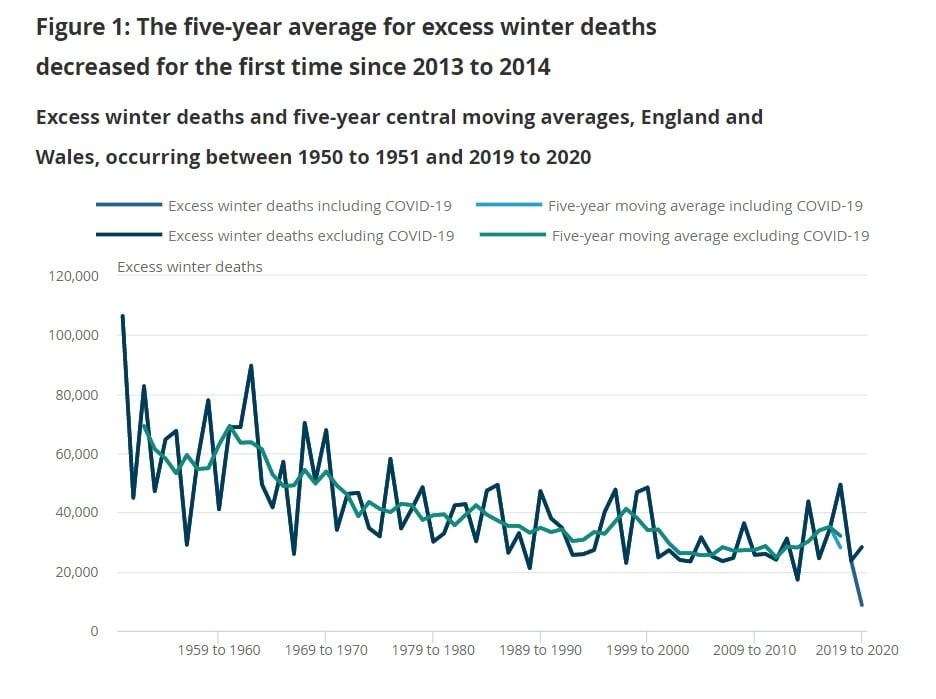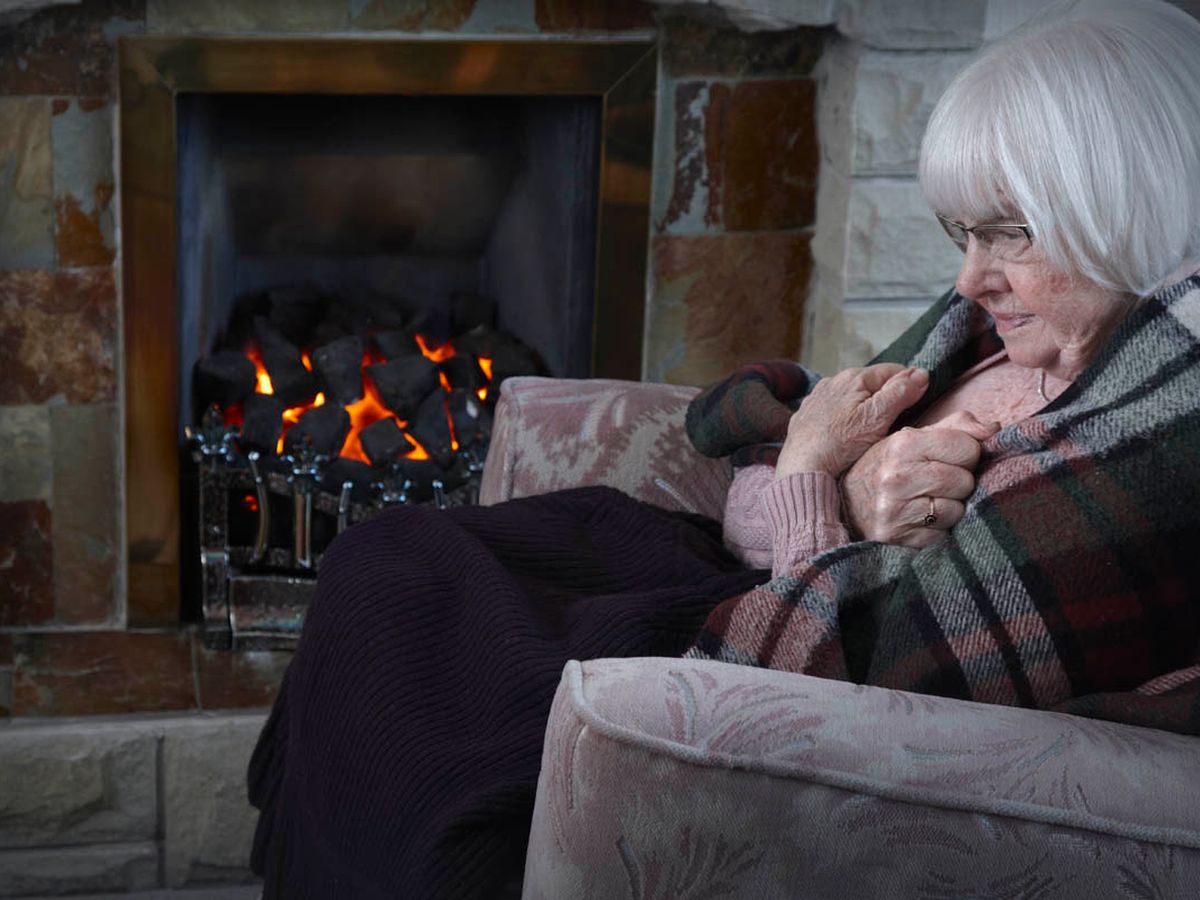For several years now, there have been reports in the Russian media and social networks about British pensioners who cannot afford to pay utilities and therefore die from the cold. We checked how true this is.
At the beginning of October 2021, the topic of British pensioners dying of cold raised Margarita Simonyan in the “60 Minutes” program on the “Russia 1” channel: “People ask me: “If we are so good and they are so bad, why do they live so much better than us?” I always say to these people: “Who told you this? You have an idea about this from Hollywood films. By what criteria do you measure what we call “better to live” and what is called “worse to live”?” For example, I always tell them: “Do you know that in the UK tens of thousands of pensioners freeze to death in their homes in winter? This is not now (I’m even scared to think how many of them will freeze to death this winter), this is usually! That is, every spring data is published that another 20,000 pensioners could not afford to heat their home and froze to death in their home. This is such an annual statistic. Why does no one know about this? Because freedom-loving media and outlets don’t talk about this. You won’t read this anywhere, except, strictly speaking, here on Russia Today.”
In 2020, Simonyan in a note for Komsomolskaya Pravda spoke about 100 pensioners who “routinely freeze to death in their homes in winter.” This topic was touched upon earlier "New News" and some other publications, and Rossiyskaya Gazeta mentioned British elderly dying from hypothermia back in 2007.
Do pensioners really freeze?
Contrary to Simonyan’s statement, at least the British media are not hiding the problem, but constantly her are discussing, and in these publications there are estimates from 3,000 to 32,000 deaths. At the same time, the expression “froze to death” is not found in these publications; instead, another is used - cold-related deaths, which does not mean death from hypothermia, but any diseases that could develop in people living in insufficiently warm houses.
There is also another term - “excess winter deaths” (EWD). But these are also not pensioners frozen to death, but a rounded difference between the number of deaths in the “winter” months (December to March) and the average number of deaths for the rest of the year for the country as a whole. All ages are counted, not just the elderly.
The data for the discussion is usually taken from the annual reports of the Office for National Statistics (ONS). The Guardian journalist also refers to these reports Don Foster, and director of the charity Age UK Caroline Abrams, and many other journalists, politicians and social activists.
Here, for example, comparative report ONS for winter 2018-2019 and winter 2019-2020. What should you pay attention to in it? First of all, the fact that excess mortality in winter is not caused by freezing or hypothermia. The compilers believe that in winter, mortality increases significantly, primarily from respiratory and cardiovascular diseases, as well as from dementia and Alzheimer's disease. Hypothermia is not on the list of the most common causes.
Moreover, in one of the previous reports (comparing winters 2016–2017 and 2017–2018) is specifically clarified: although winter mortality is associated with low temperatures, cold itself is not the cause of increased winter mortality.
It also gives a number of reasons why this problem occurs in England and Wales. The compilers named among them the lack of habit of dressing warmly (typical for residents of countries with mild climates), as well as poor housing, which is characterized by low energy efficiency (in the UK, where frosts do not occur so often, many houses do not have good thermal insulation or even double glazing, and with the onset of severe cold every few years, sometimes down to -10 ° C, their inhabitants have a hard time).
Prolonged exposure to cold causes high blood pressure, which is dangerous for people suffering from cardiovascular diseases, and, of course, creates a favorable background for the development of respiratory diseases: bronchitis, pneumonia, etc. The head of Age UK, Caroline Abrams, also sure, that there are several reasons for the situation: “Poor quality housing, high prices for utility bills and health problems in general.”
Therefore, it is incorrect to say that these people froze to death. Such statements are as justified as if doctors wrote about a person who died of lung cancer that he died from smoking. The cold in Britain (and in any other country where there is winter) is less a killer than an accomplice that prepares a “crime scene” for influenza, pneumonia, heart disease and other real “killers”.
Where did the number 20,000 come from?
According to the same ONS reports, the EWD rate (again, taking into account all ages, not just pensioners) over the past 20 years varied from year to year from 17,000 to 48,000, and the arithmetic average for five years remained at the level of 25,000 - 30,000. Perhaps the head of Russia Today had these numbers in mind, although frozen people have absolutely nothing to do with it.

At the beginning of 2020, similar statements dismantled our colleagues from the British fact-checking project Full Fact. They point out that, according to official statistics, there were more than 25,000 excess deaths in the UK (excluding Northern Ireland) in the winter of 2018/19. At least 18,500 of them were among people aged 75 and over. After studying reports and statistics, Full Fact concluded that freezing itself was not the cause of death - people died from respiratory and other diseases.
These same thousands are sometimes mentioned by the British media, politicians and social activists who want to draw attention to the problem of high energy prices, which is why some people (by the way, not only pensioners) are forced to save on heating (and, as a result, on their health). But again, this is not freezing to death.
How many people actually freeze?
It was not possible to find national statistics on this matter. At the same time, ONS annually publishes statistics on English and Welsh deaths, broken down by age, gender and cause of death. According to these data, in 2019, most older people died from cardiovascular and chronic respiratory diseases, as well as Alzheimer's disease.


As can be seen from the tables, hypothermia is not among the most common causes of death. Moreover, even such “monsters” as influenza and pneumonia (which are cold-related) did not reach a total of 20,000 among Englishmen and Welsh people over the age of 80 for the entire 2019.
Data on deaths directly due to hypothermia available in Scotland, and there we are talking about dozens of people a year. Particularly in 2020 registered 40 such cases. These poor fellows are truly frozen. In the whole of the United Kingdom, their number could probably reach several hundred, but certainly not tens of thousands.
Mostly not true
- Office for National Statistics. Excess winter mortality in England and Wales: 2019 to 2020 (provisional) and 2018 to 2019 (final)
- Office for National Statistics. Deaths registered in England and Wales
- Full Fact. There were 25,260 excess winter deaths across all ages in Great Britain last year
If you find a spelling or grammatical error, please let us know by highlighting the error text and clicking Ctrl+Enter.







